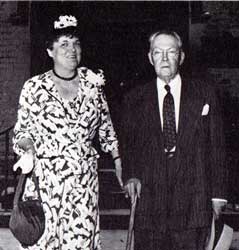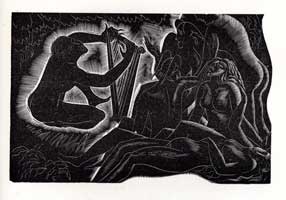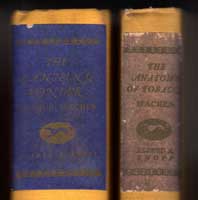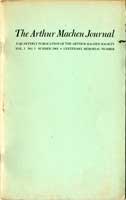TEA PARTY AT POYNTON LODGE
by Thomas Horan
Reprinted from The Arthur Machen Journal, Vol. 1 No. 1, Summer, 1963
 In a changing world, it is good to know that some things are eternal. Tastes change in reading matter almost as often as they do in the world of fashion. One week it’s this; next week, that. So I was delighted to find, one beautiful summer morning in Ophelia, Virginia, that a literary enthusiasm had endured down through the years, undiminished and undimmed— I mean James Branch Cabell's admiration for the prose of Arthur Machen.
In a changing world, it is good to know that some things are eternal. Tastes change in reading matter almost as often as they do in the world of fashion. One week it’s this; next week, that. So I was delighted to find, one beautiful summer morning in Ophelia, Virginia, that a literary enthusiasm had endured down through the years, undiminished and undimmed— I mean James Branch Cabell's admiration for the prose of Arthur Machen.
Long before Jurgen was published, Mr. Cabell wrote to friends, urging them to read Machen. And as early as January, 1919, he praised Machen in print as a genius and said that neglect of Machen's books was the sort of crime that should be shouted from the housetop. Some years later, when I visited Mr. Cabell in Richmond to get material for an interview for the Atlantic Journal, he had not wavered in his devotion to Machen's prose. He had good words to say, and he said them. But his praise, as is all just praise, was tempered. I remember that he was dissatisfied (not with Machen) but with the sequence of the stories in The House of Souls which recently had been published in America. He did not believe that the tales were part of one work. But he did feel that a story like “The Inmost Light” (4) aided a reader to grasp the point of “The Great God Pan” (3) which, in turn, made “The White People” (2) much easier going. He also maintained that these three tales prepared the reader for an understanding, at least a partial understanding, of that really curious fantasy, “A Fragment of Life”, which opens the book. What it all boils up to is that Mr. Cabell did not think that a person should run headlong into “A Fragment of Life” unprepared. He felt this strongly, implying that the success of the volume depended almost entirely upon the order of its parts.
We talked that day in Richmond of a number of disparate writers: Lewis Carroll,Conan Doyle, Jules Laforgue, Richard Middleton, Frances Newman....And I was reminded that it was Frances Newman, during her school days in Atlanta, who had cooked up a theory that writers who take first-rate music seriously never got around to writing first-rate sentences. The theory, as well as I remember, had something to do with the vast difference between the rhythm and timbre of music and the rhythm and timbre of prose sounds. Frances stressed her point by mentioning one of the grander grandames of Atlanta who “always behaved as if she owned painting and music, and had a controlling interest in literature”. There was another theory she doted on in those days (that the best books are not necessarily written by the best writers); but that, of course, is another batch of margaritas.
 As for the music theory, I can't recall that either Machen or Cabell has ever been very serious in his praise of serious music. Turn again if you will to The Music From Behind the Moon and you will see what I mean. Mr. Cabell has his characters sing, or strum on lutes, in the old days; but nowhere do I find that he dwells on the importance of music. Quite the opposite. And he has been shown to remark that, if he ever had to visit an operating table, he hoped to goodness that during the operation the surgeon wouldn't be thinking of Beethoven. Arthur Machen brings music into his stories occasionally. But he usually takes his oblique tincture of elf song, or the high, thin singing of magical birds after a thunderstorm. It is also on record that Machen's grandfather was a most amiable man, but he could not bear radishes or the Adeste Fideles.
As for the music theory, I can't recall that either Machen or Cabell has ever been very serious in his praise of serious music. Turn again if you will to The Music From Behind the Moon and you will see what I mean. Mr. Cabell has his characters sing, or strum on lutes, in the old days; but nowhere do I find that he dwells on the importance of music. Quite the opposite. And he has been shown to remark that, if he ever had to visit an operating table, he hoped to goodness that during the operation the surgeon wouldn't be thinking of Beethoven. Arthur Machen brings music into his stories occasionally. But he usually takes his oblique tincture of elf song, or the high, thin singing of magical birds after a thunderstorm. It is also on record that Machen's grandfather was a most amiable man, but he could not bear radishes or the Adeste Fideles.
In that far-away time in Richmond, Mr. Cabell, in his upstairs reading room, showed me his zoo of small animals made of china, brass, and crystal. He also showed me his superb collections of books on occult themes, myths of the world, legends, folklore, demonology, and witchcraft. But the thing I remembered most about that visit was his insistence on an almost pious levity that touched nearly everything he said — a lightness, a wit, an urbanity that glinted and sparkled, and also shone warmly under the actual words he used. I remember particularly a remark he made about the books in a certain set of shelves in his library. “The volumes on this side of the room,” he said, “have been meticulously arranged according to one inviolable and fast rule: each of them is eight inches tall.”
This love of the absurd was a cachet of his conversation; and his fund of learned levity was lively and in abundance when I visited him in the Northern Neck of Virginia. Mrs. Cabell — Margaret Freeman Cabell — is, beyond any shadow of a doubt, one of the most charming hostesses I have ever known. At luncheon or dinner (or at an afternoon tea), she can bring all present into a happy circle of conversation, blend small talk with empirical remarks, pull any loose ends together, and turn an otherwise ordinary affair into a well-ordered, three-ring circus — a scintillating festival of wit and erudition. The amazing thing is that she does all this without apparent effort. There is the art. The effect is magic.
 This wonder-working was set a-going that sunny morning at Poynton Lodge in Northumberland County, Virginia. It was Saturday, July 7, 1956. Despite reams of conversation and much picture-taking, the highlight of the day was Mrs. Cabell’s superb luncheon which featured delicious snow-white Chesapeake crab meat and mouth-watering Southern fried chicken. And though ostensibly it was a luncheon, it assumed, under Mrs. Cabell's charm, the character of an Ambrosian feast— a tea party straight out of wonderland. During the morning, Mr. Cabell had talked of the art of Arthur Machen. By the way, he pronounced it May-chen— the way the Virginia Machens pronounce their name. And when I heard his reiterated words of praise (not without a few minor reservations), I was pleased to know that a literary enthusiasm does endure when it concerns a writer of Machen's stature. But the love of nonsense was in the air at Mrs. Cabell's luncheon. Mr. Cabell was making great pretense of defending a mock charge that never in his life had he had a good word to say for music. And when asked if he liked Gilbert and Sullivan, he almost shouted, "I like both of them." Then with a great show of seriousness he added, "Certainly I like music. I like Mendelssohn. I like the Wedding March." And on it went. So it is not surprising that when Machen's name was brought up during the luncheon that Mr. Cabell rested his knife and fork and looked solemnly at the ceiling. "I like May-chen, you know," he said slowly and deliberately. Then, perhaps to get a rise out of me, he added, "But the labels fade so badly."
This wonder-working was set a-going that sunny morning at Poynton Lodge in Northumberland County, Virginia. It was Saturday, July 7, 1956. Despite reams of conversation and much picture-taking, the highlight of the day was Mrs. Cabell’s superb luncheon which featured delicious snow-white Chesapeake crab meat and mouth-watering Southern fried chicken. And though ostensibly it was a luncheon, it assumed, under Mrs. Cabell's charm, the character of an Ambrosian feast— a tea party straight out of wonderland. During the morning, Mr. Cabell had talked of the art of Arthur Machen. By the way, he pronounced it May-chen— the way the Virginia Machens pronounce their name. And when I heard his reiterated words of praise (not without a few minor reservations), I was pleased to know that a literary enthusiasm does endure when it concerns a writer of Machen's stature. But the love of nonsense was in the air at Mrs. Cabell's luncheon. Mr. Cabell was making great pretense of defending a mock charge that never in his life had he had a good word to say for music. And when asked if he liked Gilbert and Sullivan, he almost shouted, "I like both of them." Then with a great show of seriousness he added, "Certainly I like music. I like Mendelssohn. I like the Wedding March." And on it went. So it is not surprising that when Machen's name was brought up during the luncheon that Mr. Cabell rested his knife and fork and looked solemnly at the ceiling. "I like May-chen, you know," he said slowly and deliberately. Then, perhaps to get a rise out of me, he added, "But the labels fade so badly."
The bluish-purple labels of the Knopf yellow books do fade badly (and quickly in a good light), as heaven only knows does also the gilt lettering on the spines of most of the Kalki Brown volumes of Mr. Cabell. But that is the point. That is the wonder of the thing. Choose a volume from either set at random. Open a book whose name you do not know. Read anywhere you will, and you assuredly will find some of the most rewarding prose that the English language affords.
